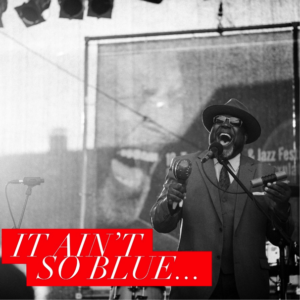It Ain’t So Blue
We’ve all heard of the Blues – BB King, Muddy Waters, The Blues Brothers (ok, technically not Blues masters but a great comedy) – however, the origins of the Blues are quite complex and it has been a continually evolving genre influencing many of our modern music styles such as Rhythm and Blues (RnB) and rock and roll. Think of Elvis’s early songs.
While the Blues is often associated with life’s adversities and feeling ‘blue’, on the flip side, it also represents raucous dancing and fun, rising from the new generation of African Americans establishing themselves in society in the late 19th Century, after the abolition of slavery in 1865.
Origins
The Blues originated in the Southern States of America in the early 1890s, where African slaves, ex-slaves and the descendants of slaves sang as they toiled in the cotton and vegetable fields, singing African spiritual songs, African chants, work songs, field hollers, rural fife and drum music, revivalist hymns, and country dance music. As slavery was abolished and African Americans began to integrate into society, the Blues music was performed in a variety of settings and styles with musicians often playing in ‘tent shows’ while accompanying travelling doctors, musical companies, comedians, magicians, and even circuses. Ballads would be played, as well as ragtime, Gospel songs, and folk tunes.
As the twentieth century progressed, so did the Blues with bands evolving from early jazz bands, gospel choirs and jug bands. Jug band music was popular in the South until the 1930s. Early jug bands featured jugs, guitars, mandolins, banjos, kazoos, stringed basses, harmonicas, fiddles, washboards and other everyday appliances converted into crude instruments. However, by the 1930s, the Blues became influenced by other modern cultures and music, incorporating guitar, piano, drums and developing percussion instruments, including the introduction of the saxophone in the 1940s.
Father of the Blues
No one person is really responsible for the Blues, however, minstrel show bandleader W.C. Handy is said to be a founder. He heard a man singing and playing guitar on the streets, pressing the blade of his knife on the strings. This made an impression on Handy, who described the performance as ‘haunting’. Using his talent and musical education, he copied the traveller’s 12-bar song structure with a few additions including flattened ‘blue notes’ and the Blues 12-bar structure was born.
Handy was later commissioned to write a campaign song for the elections in Memphis, Tennessee and his twelve-bar opus was titled ‘Memphis Blues’. Through his continued work, he earned the title ‘Father of the Blues’.

Different shades of Blues
As culture and music has evolved, so too did has the Blues. Some of the variants of the Blues are instantly recognisable and have pioneered many of our modern musical genres:
- Traditional county blues: a general term that describes the rural blues of the Mississippi Delta and its local regions.
- Jump blues: a danceable amalgam of swing and blues and a precursor to R&B, pioneered by Louis Jordan.
- Boogie-woogie: a piano-based blues popularised by Meade Lux Lewis, Albert Ammons and Pete Johnson, and derived from barrelhouse and ragtime.
- Chicago blues: Delta blues electrified by amp-based instruments and particularly an amplified harmonica.
- Cool blues: A sophisticated piano-based form that owes much to jazz.
- West Coast blues: Heavily influenced by the swing beat.
Other types of Blues include, the Texas Blues, Memphis Blues, and St. Louis Blues which all consist of a wide variety of subgenres. Louisiana Blues is characterised by a swampy guitar or harmonica sound with lots of echo, while Kansas City Blues is jazz influenced, for example, music from Count Basie. There is also the British Blues, a rock-blues hybrid pioneered by John Mayall, Peter Green and Eric Clapton.
Top 10 Classic Blues
1. Memphis Blues – W.C. Handy
2. Crazy Blues – Mamie Smith
3. Pine Top Boogie – Pine Top Smith
4. Dust My Broom – Elmore James
5. Boogie Chillun – John Lee Hooker
6. Mannish Boy – Muddy Waters
7. Stormy Monday – T-Bone Walker
8. Hellhound – On My Trail – Robert Johnson
9. Spoonful – Willie Dixon
10. The Thrill Is Gone – B.B. King
Harmeet February 9th, 2018
Posted In: Uncategorised